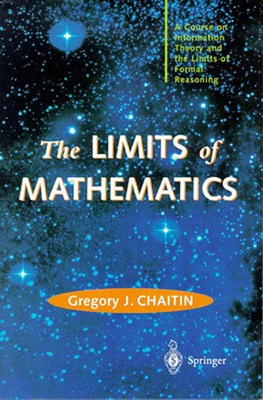

G. J. Chaitin. The Limits of Mathematics. A course on information theory & the limits of formal reasoning Hardcover, Springer-Verlag, Singapore, 1997, 166 pp. ISBN: 981-3083-59-X. US$29 hardcover. Springer, New York press release.
This book presents the final version of Chaitin's course on the limits of mathematical reasoning. This course uses algorithmic information theory to show that mathematics has serious limitations, and features a new more didactic approach to algorithmic information theory using lisp and Mathematica software. The thesis of the book is that the incompleteness phenomenon discovered by Gödel is much more widespread and serious than hitherto suspected. Also Gödel and Einstein's views on the foundations of mathematics are discussed, and it is suggested that mathematics is quasi-empirical and that experimental mathematics should be used more freely. The software for this book can be downloaded from MathSource at Wolfram Research at http://www.wolfram.com by querying for "0208-820''. Click here for Ivars Peterson's MathTrek on The Limits of Mathematics. Jon Turney Accentuates the Impossible .
"The Limits of Mathematics is a very personal and
idiosyncratic
account of Greg Chaitin's entire career in developing algorithmic
information
theory. The combination of the edited transcripts of his three introductory
lectures maintains all the energy and content of the oral presentations,
while the material on AIT itself gives a full explanation of how
to implement Greg's ideas on real computers for those who want to try their
hand at furthering the theory.''
---John Casti, Santa Fe Institute
Contents:
NEW! The LISP interpreter for this book is now available as a Java applet! To try it, click here.
Reviews: